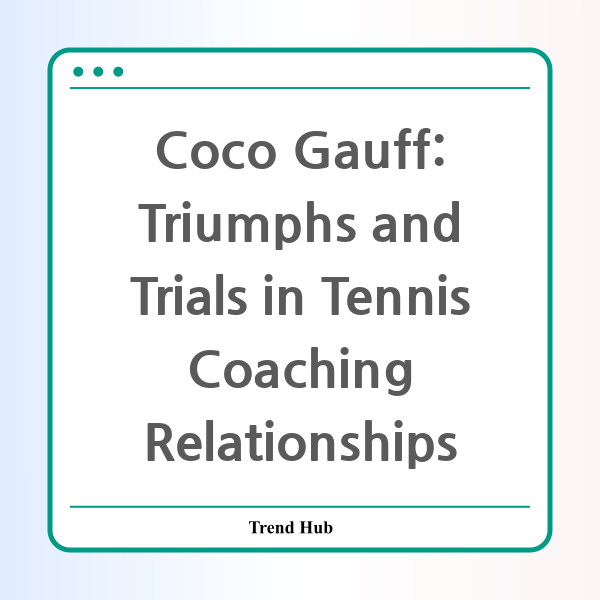* This website participates in the Amazon Affiliate Program and earns from qualifying purchases.

What happens when success in sports intersects with personal relationships? The recent controversies surrounding tennis star Coco Gauff and her experiences in the world of coaching highlight this thought-provoking question. While Gauff continues to ascend in her tennis career, the dynamics of coaching relationships can significantly impact athletes, as demonstrated by the tumultuous situation involving fellow player Elena Rybakina and her former coach, Stefano Vukov.
The relationship between a coach and an athlete is complex and can be pivotal to the athlete’s success. In Rybakina’s case, it was marked by a series of disturbing allegations regarding Vukov’s conduct while coaching her. Reports suggest that his coaching methods, which some deemed abusive, have consequently led to a significant investigation by the Women’s Tennis Association (WTA). The findings uncovered a troubling pattern: Vukov’s behavior included verbal abuse and manipulation that strained Rybakina's mental and physical well-being. This raises critical discussions about the importance of healthy coaching environments in sports.
In August 2024, just days before the U.S. Open, the situation escalated when Vukov attempted to reconnect with Rybakina despite her clear decision to part ways. His actions, which included numerous phone calls and texts, caused significant alarm among Rybakina's team, prompting them to take steps to ensure her safety. The WTA's investigation ultimately led to a suspension of Vukov, citing multiple violations of the code of conduct, including harassment and creating an unhealthy dependency.
As we delve deeper into this topic, it becomes clear that the relationship between athletes and their coaches can sometimes resemble a double-edged sword. On one hand, a good coach can instill confidence, boost performance, and lead to remarkable achievements. On the other hand, a negative dynamic can lead to detrimental effects, as seen in Rybakina’s case. The emotional toll and the psychological ramifications of such relationships should never be underestimated.
Notably, Rybakina's decision to publicly defend Vukov after his suspension speaks volumes about the complexities of such relationships. While many players would distance themselves from a controversial figure, Rybakina's loyalty complicates the narrative. It is important to recognize that these dynamics are not uncommon in the world of sports, where boundaries can blur and personal feelings often interfere with professional decisions.
This brings us back to Coco Gauff. As she navigates her rise in women's tennis, the lessons learned from Rybakina’s situation serve as reminders for both players and coaches alike. The essence of a healthy coaching relationship is built on mutual respect, open communication, and the athlete's well-being. Coaches must understand their significant influence on an athlete’s mental state, and prioritize creating a supportive environment that fosters growth rather than dependency.
As Gauff continues her journey, the tennis community watches closely, hoping her relationships with her coaches remain supportive and nurturing. It’s crucial for upcoming athletes to learn from the stories of established players, ensuring that their paths are not marred by toxic relationships.
Ultimately, the goal is to cultivate a culture of respect within professional sports, where coaching strategies empower rather than diminish athletes. The tennis world must reflect on cases like Rybakina’s to foster an environment where every player can thrive both on and off the court. At the end of the day, the success of an athlete is not just measured by trophies but also by the quality of the relationships they maintain along the way.
* This website participates in the Amazon Affiliate Program and earns from qualifying purchases.